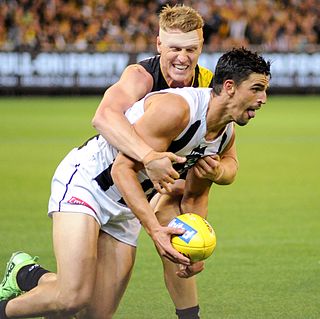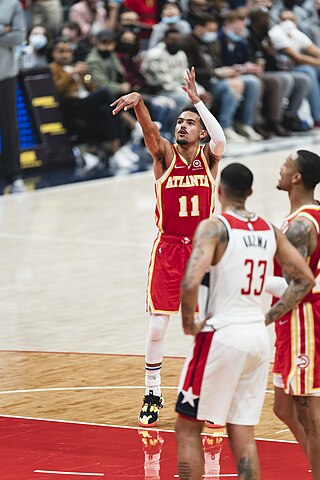Related Research Articles

Most forms of football have a move known as a tackle. The primary purposes of tackling are to dispossess an opponent of the ball, to stop the player from gaining ground towards goal or to stop them from carrying out what they intend.

Gaelic football, commonly known as simply Gaelic, GAA or football, is an Irish team sport. A form of football, it is played between two teams of 15 players on a rectangular grass pitch. The objective of the sport is to score by kicking or punching the ball into the other team's goal or between two upright posts above the goal and over a crossbar 2.5 metres above the ground.

Futsal is a football-based game played on a hardcourt like a basketball court, smaller than a football pitch, and mainly indoors. It has similarities to five-a-side football and indoor football.

Gridiron football, also known as North American football, or in North America as simply football, is a family of football team sports primarily played in the United States and Canada. American football, which uses 11 players, is the form played in the United States and the best known form of gridiron football worldwide, while Canadian football, which uses 12 players, predominates in Canada. Other derivative varieties include arena football, flag football and amateur games such as touch and street football. Football is played at professional, collegiate, high school, semi-professional, and amateur levels.
The Laws of the Game are the codified rules of association football. The laws mention the number of players a team should have, the game length, the size of the field and ball, the type and nature of fouls that referees may penalise, the offside law, and many other laws that define the sport. During a match, it is the task of the referee to interpret and enforce the Laws of the Game.

In basketball, free throws or foul shots are unopposed attempts to score points by shooting from behind the free-throw line, a line situated at the end of the restricted area. Free throws are generally awarded after a foul on the shooter by the opposing team, analogous to penalty shots in other team sports. Free throws are also awarded in other situations, including technical fouls, and when the fouling team has entered the bonus/penalty situation. Also, depending on the situation, a player may be awarded between one and three free throws. Each successful free throw is worth one point.
In American and Canadian football, pass interference (PI) is a foul that occurs when a player interferes with an eligible receiver's ability to make a fair attempt to catch a forward pass. Pass interference may include tripping, pushing, pulling, or cutting in front of the receiver, covering the receiver's face, or pulling on the receiver's hands or arms. It does not include catching or batting the ball before it reaches the receiver. Once the ball touches any defensive player or eligible offensive receiver, the above rules no longer apply and the defender may tackle the receiver or attempt to prevent them from gaining control of the ball. Once a forward pass is in the air it is a loose ball and thus any eligible receiver – all defensive players are eligible receivers – may try to catch it. When a defensive player catches a forward pass it is an interception and their team gains possession of the ball. Some actions that are defined as pass interference may be overlooked if the defender is attempting to catch or bat the ball rather than focusing on the receiver.
In various sports, a professional foul is a deliberate act of foul play intended to bring about an advantage for the perpetrator's team. Professional fouls are usually committed to prevent an opponent from scoring.

In gridiron football, an official is a person who has responsibility in enforcing the rules and maintaining the order of the game.

The rules of basketball are the rules and regulations that govern the play, officiating, equipment and procedures of basketball. While many of the basic rules are uniform throughout the world, variations do exist. Most leagues or governing bodies in North America, the most important of which are the National Basketball Association and NCAA, formulate their own rules. In addition, the Technical Commission of the International Basketball Federation (FIBA) determines rules for international play; most leagues outside North America use the complete FIBA ruleset.

In sports, an ejection is the removal of a participant from a contest due to a violation of the sport's rules. The exact violations that lead to an ejection vary depending upon the sport, but common causes for ejection include unsportsmanlike conduct, violent acts against another participant that are beyond the sport's generally accepted standards for such acts, abuse against officials, violations of the sport's rules that the contest official deems to be egregious, or the use of an illegal substance to better a player's game. Most sports have provisions that allow players to be ejected, and many allow for the ejection of coaches, managers, or other non-playing personnel. In sports that use penalty cards, a red card is often used to signal dismissals. In some sports, another player is permitted to enter the game in place of the player who has been ejected, but in others the team is required to continue the game with a reduced number of players.
The 1940 NFL season was the 21st regular season of the National Football League. The season ended when the Chicago Bears defeated the Washington Redskins in the NFL Championship Game by 73–0; this result still stands as the most one-sided victory in NFL history as of the 2023 season.

In the sport of association football, fouls and misconduct are acts committed by players which are deemed by the referee to be unfair and are subsequently penalised. An offence may be a foul, misconduct or both depending on the nature of the offence and the circumstances in which it occurs. Fouls and misconduct are addressed in Law 12 of the Laws of the Game. A foul is an unfair act by a player, deemed by the referee to contravene the game's laws, that interferes with the active play of the match. Fouls are punished by the award of a free kick to the opposing team. A list of specific offences that can be fouls are detailed in Law 12 of the Laws of the Game ; these mostly concern unnecessarily aggressive physical play and the offence of handling the ball. An infringement is classified as a foul when it meets all the following conditions:
- It is committed by a player ;
- It occurs on the field of play;
- It occurs while the ball is in play;
- It is committed against an opponent.

In basketball, a flagrant foul is a personal foul that involves excessive or violent contact that could injure the fouled player. A flagrant foul may be unintentional or purposeful; the latter type is also called an "intentional foul" in the National Basketball Association (NBA). However, not all intentional fouls are flagrant fouls, as it is an accepted strategy to intentionally commit a foul in order to regain possession of the ball while minimizing how much time elapses on the game clock.

Penalty cards are used in many sports as a means of warning, reprimanding or penalising a player, coach or team official. Penalty cards are most commonly used by referees or umpires to indicate that a player has committed an offence. The official will hold the card above their head while looking or pointing toward the player who has committed the offence. This action makes the decision clear to all players, as well as spectators and other officials in a manner that is language-neutral. The colour or shape of the card used by the official indicates the type or seriousness of the offence and the level of punishment that is to be applied. Yellow and red cards are the most common, typically indicating, respectively, cautions and dismissals.

Unsportsmanlike conduct is a foul or offense in many sports that violates the sport's generally accepted rules of sportsmanship and participant conduct. Examples include verbal abuse, taunting of an opponent or a game official, an excessive celebration following a significant play, or feigning injury. The official rules of many sports include a general provision whereby participants or an entire team may be penalized or otherwise sanctioned for unsportsmanlike conduct.
In Canadian football, the three-minute warning is given when three minutes of game time remain on the game clock in the first and second halves of a game. The three-minute warning stops the game clock in all cases. American football has a two-minute warning.

A penalty shot or penalty kick is a play used in several sports whereby a goal is attempted during untimed play. Depending on the sport, when a player commits certain types of penalties, the opposition is awarded a penalty shot or kick attempt. The rules on how a player attempts a penalty shot or kick also varies between sports.

In gridiron football, a penalty is a sanction assessed against a team for a violation of the rules, called a foul. Officials initially signal penalties by tossing a bright yellow colored penalty flag onto the field toward or at the spot of a foul.
Kevin Clancy is a Scottish football referee who has been on the international list of FIFA referees since January 2012 after attending a course at Specsavers Centre of Refereeing Excellence. Clancy has been refereeing since 2000.
References
- ↑ DDT Online [ dead link ]